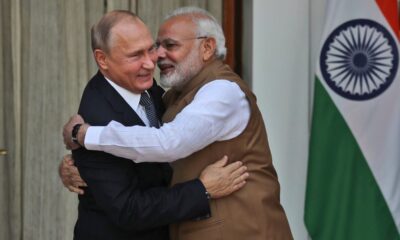Top Stories
India’s Russian Oil Buying Surge Criticized as “Opportunistic”

UPDATE: The White House is sounding alarms over India’s significant increase in Russian oil purchases, labeling the practice as “opportunistic and deeply corrosive.” This urgent statement comes from White House trade adviser Peter Navarro, who issued his concerns in a recent column for the Financial Times.
Navarro’s comments emphasize that India’s actions undermine global efforts to isolate the Kremlin and curb Vladimir Putin’s military ambitions. He asserts that the surge in India’s oil imports is not driven by domestic needs but rather by the financial interests of India’s oil industry, particularly benefiting politically connected figures.
Historically, India has not relied heavily on Russian crude oil, typically sourcing from the Middle East. However, as of 2022, India now imports about 37% of its crude from Russia, a dramatic shift attributed to the $60-per-barrel price cap imposed by the Group of Seven (G7) nations. This cap aims to limit Russia’s oil revenue while maintaining global supply.
Navarro argues that the Indian government’s trade relationship with Russia effectively turns India into a “global clearinghouse” for Russian oil. “American consumers buy Indian goods,” he states, pointing out that India uses those revenues to purchase discounted Russian crude. This financial cycle, he warns, provides the Kremlin with critical resources for its ongoing military operations.
The criticism extends to India’s oil giants, notably Reliance Industries Ltd., owned by billionaire Mukesh Ambani, which has been reported to engage in long-term contracts for Russian oil. “The proceeds flow to India’s politically connected energy titans, and in turn, into Vladimir Putin’s war chest,” Navarro states emphatically.
In response to India’s actions, former President Donald Trump has enacted a steep 50% tariff on Indian imports, a punitive measure reflecting the U.S. stance on India’s dealings with Russia. This tariff, which is set to take effect next week, is expected to significantly impact India’s access to U.S. markets.
“The two-pronged policy will hit India where it hurts,” Navarro adds, emphasizing the urgency for India to reconsider its trade practices if it aspires to be a strategic partner of the United States. As these developments unfold, the implications for global oil markets and international relations are profound.
Stay tuned for further updates as this situation evolves and the international community reacts to India’s controversial oil trade practices.
-

 Politics4 weeks ago
Politics4 weeks agoSecwepemc First Nation Seeks Aboriginal Title Over Kamloops Area
-

 World5 months ago
World5 months agoScientists Unearth Ancient Antarctic Ice to Unlock Climate Secrets
-

 Entertainment5 months ago
Entertainment5 months agoTrump and McCormick to Announce $70 Billion Energy Investments
-

 Science5 months ago
Science5 months agoFour Astronauts Return to Earth After International Space Station Mission
-

 Lifestyle5 months ago
Lifestyle5 months agoTransLink Launches Food Truck Program to Boost Revenue in Vancouver
-

 Technology3 months ago
Technology3 months agoApple Notes Enhances Functionality with Markdown Support in macOS 26
-

 Lifestyle3 months ago
Lifestyle3 months agoManitoba’s Burger Champion Shines Again Amid Dining Innovations
-

 Top Stories2 months ago
Top Stories2 months agoUrgent Update: Fatal Crash on Highway 99 Claims Life of Pitt Meadows Man
-

 Politics4 months ago
Politics4 months agoUkrainian Tennis Star Elina Svitolina Faces Death Threats Online
-

 Sports5 months ago
Sports5 months agoSearch Underway for Missing Hunter Amid Hokkaido Bear Emergency
-

 Politics5 months ago
Politics5 months agoCarney Engages First Nations Leaders at Development Law Summit
-

 Technology5 months ago
Technology5 months agoFrosthaven Launches Early Access on July 31, 2025




















